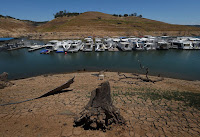In the absence of global action to curb greenhouse gas emissions, the United States by the end of the century may face up to $180 billion in economic losses because of drought and water shortages, according to a report released Monday by the White House and Environmental Protection Agency.
White House officials said the report, which analyzes the economic costs of a changing climate across 20 sectors of the American economy, is the most comprehensive effort to date to quantify the impacts of global warming.
The report comes as President Obama is trying to build political support both at home and abroad for an ambitious climate change agenda. During the president’s six and a half years in office, the E.P.A. has released a series of regulations and legal decisions aimed at reining in planet-warming greenhouse gases from cars, trucks, power plants and airplanes. Mr. Obama hopes to use those regulations as leverage to broker a United Nations accord in Paris this December that would commit all nations to enacting similar emissions cuts.
“That’s what we’re going to use to push other countries to join in global climate action,” said Brian Deese, Mr. Obama’s senior climate and energy policy adviser.
The report, “Climate Change in the United States: Benefits of Global Action,” used existing scientific and economic studies on the projected impacts of unchecked global climate change emissions. It compared those with a future in which global emissions are reduced enough to prevent a rise in average atmospheric temperatures of 2 degrees Celsius, or 3.6 degrees Fahrenheit, the point at which, scientists say, the planet will be locked into an irreversible future of rising sea levels, stronger storms, extreme drought, food shortages and other damages.
The report was conducted by the E.P.A.’s Office of Atmospheric Programs along with researchers from the Massachusetts Institute of Technology and scientific laboratories run by the Energy Department. The results were peer reviewed in scientific literature, and the summary report was independently reviewed by seven external experts.
The report found that global policy to curb climate change could prevent 12,000 deaths from extreme heat and cold, or what it estimated as $200 billion in savings to the American economy by 2100. It also said climate policy could prevent 720 to 2,200 bridges from becoming structurally vulnerable for an estimated savings by the end of the century of $1.1 billion to $1.6 billion.
In addition, the report found that climate policy could prevent $50 million to $6.4 billion in adaptation costs to urban drainage systems, which could be flooded by extreme storms.
If climate change is mitigated, the report found a 40 percent to 59 percent reduction in probability of extreme drought, which would otherwise cost American farmers $2.6 billion to $3.1 billion.
Read more at E.P.A. Warns of High Cost of Climate Change

No comments:
Post a Comment